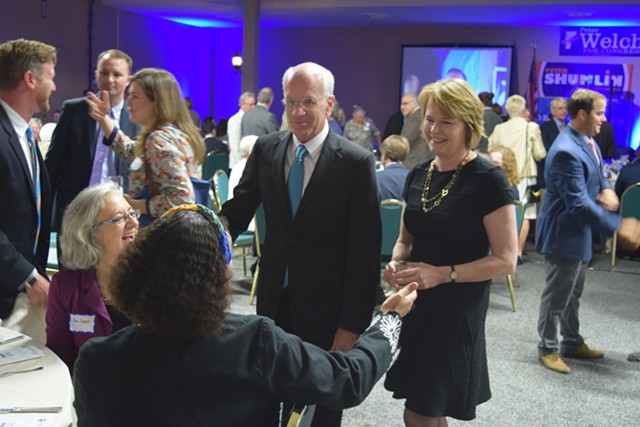
- File: Terri Hallenbeck
- Congressman Peter Welch and Public Utility Commissioner Margaret Cheney at a Vermont Democratic Party gathering
On March 1, Vermont Public Utility Commissioner Margaret Cheney signed permits for three T-Mobile cell towers in Chittenden County. Five days later, the company's political action committee spent $500 hosting Cheney's husband, Congressman Peter Welch (D-Vt.), at a campaign fundraiser.
Within two weeks of the permit approvals, on March 12, the T-Mobile PAC cut a $2,500 check to Welch's reelection campaign. Soon after that, on March 27, T-Mobile filed another motion with Cheney’s Public Utility Commission, this time to update equipment at a Jay Peak cell site.
Welch and Cheney maintain that neither was involved in the other’s dealings with T-Mobile. They say a strict firewall separates their respective careers.
But the episode demonstrates how their work with regulated utilities could raise at least the perception of a conflict of interest. It also raises questions as to whether Welch has abided by a 2016 pledge to refuse campaign contributions from companies appearing before Cheney’s board.
For nearly five years, Cheney has served as one of three voting members of the PUC, which until recently was known as the Public Service Board. The quasi-judicial commission regulates energy and telecommunications companies, focusing on rates, service and financial management. Welch, who was first elected to Congress in 2006, serves on the powerful House Energy and Commerce Committee, making him a magnet for campaign contributions from energy and telecom companies.
This isn’t the first time Welch has raised money from a company his wife is responsible for regulating. In July 2016, the Associated Press
reported that Welch had received $8,000 from Comcast's PAC. At the time, Cheney’s commission was considering a new license for the company to continue operating in Vermont.
In response to the AP's reporting, Cheney recused herself from the proceedings. Welch returned the Comcast donation and established a new policy: “[I]n the interest of eliminating the perception of influence going forward, Congressman Welch will not accept campaign contributions from political action committees or employees of companies appearing before the Public Service Board,” his then-spokesperson, Kirsten Hartman, said at the time.
Asked this week whether he had broken that promise by taking the T-Mobile money, Welch argued that the policy applied only to companies with business before the PUC at the very moment of a potential donation — not those that regularly appear before the commission.
"I think the question in some people’s mind is if there’s something pending, then that has more immediate resonance,” Welch said.
The distinction appears to rest on the meaning of the words “appearing before” in Welch’s 2016 statement. According to his current spokesperson, Kate Hamilton, companies “appearing before” the PUC are those with open dockets, or pending cases.
“In 2016, Congressman Welch established a policy of not accepting campaign contributions from companies with open dockets at the Public Utilities Commission,” Hamilton said in an emailed statement. “He continues to adhere to that policy. Like many professional couples, the Congressman and Commissioner Cheney successfully separate their business and personal lives. He has never been asked to influence his wife on any case before the Commission, nor would he.”
But after the PUC issues a permit to a company and closes a docket, the commission is still responsible for deciding whether or not to investigate allegations that the company has violated state regulations or special conditions in its permit. In other words: Cheney is one of three people who can, at any time, decide whether to investigate T-Mobile for regulatory violations.
Hamilton said Welch's policy has a way of dealing with that issue if allegations emerge. "Should a docket be opened to investigate an allegation that any company is not in compliance with [certificate of public good] requirements, the Congressman would not accept a campaign contribution from that company while the docket is open," she said.
Hamilton did not explain how Welch's staff monitors commission proceedings to ensure no contributions are accepted from companies with pending business. She also declined to elaborate on the nature of the March 6 fundraiser — and whether Welch had been invited to the event before or after the PUC approved T-Mobile’s permits on March 1.
A spokesperson for the company did not immediately respond to a request for comment.
T-Mobile has been generous to Welch over the years. Since 2014, its PAC has donated $9,000 to the congressman, including a $1,000 gift to his reelection campaign on April 30, 2017, according to the Federal Election Commission. A few months earlier, on January 5, 2017, T-Mobile filed “advance notice” with the PUC that it might seek changes to a permit governing a Londonderry cell tower. According to PUC records, that petition never moved forward.
In an email, Cheney maintained that her work and Welch’s do not overlap. She said she was not present at the March 2018 fundraiser and was not aware of it until
Seven Days enquired about it.
“I was in Vermont, where I have my own independent career,” she said, adding that she complies with state ethics rules and regularly signs an ethics disclosure form.
“I don’t discuss anything pending before the Public Utility Commission with Margaret," Welch said. "Her responsibilities and my responsibilities are completely separate.”
Paul Heintz contributed reporting.











Comments (9)
Showing 1-9 of 9
Comments are closed.
From 2014-2020, Seven Days allowed readers to comment on all stories posted on our website. While we've appreciated the suggestions and insights, right now Seven Days is prioritizing our core mission — producing high-quality, responsible local journalism — over moderating online debates between readers.
To criticize, correct or praise our reporting, please send us a letter to the editor or send us a tip. We’ll check it out and report the results.
Online comments may return when we have better tech tools for managing them. Thanks for reading.